Context and Problem
The educational system is increasingly focused on training students for standardized exams so they can attain the desired scores and advance to universities. This mainstream approach has hindered students' critical thinking, problem-solving, and innovation skills. Additionally, this approach makes students despise learning, and their attendance and engagement drop. However, Education for Sharing (E4S) offers a hopeful solution, with its positive impact on students' learning and engagement.
Solution
Established in E4S, Education for Sharing developed a three-step methodology: play, reflect, and act. This framework is based on the concept of play and experiential learning. The breakdown of each step is as follows: Play: E4S incorporates playful learning around Sustainable Development Goals (SDGs). The play sessions have an educational purpose and are structured based on the relevant local and global affairs. This develops civic values and collaborative skills among the students. Reflect: students reflect on their games and discuss how they felt. Additionally, they discuss what they have learned through these games. Act: Students apply what they learned in the community by creating real-life experiences for their communities. Examples of these projects include staging plays to promote gender equality, composing rap songs against violence, and organizing waste separation programs.
Impact
EFS has worked with over 1.8 million participants in 13 countries, including Argentina, Mexico, and Ecuador. The methodology employed by EFS improved student engagement and reflective capacities. For instance, in Chihuahua, Mexico, 84% of participating students observed a surge in students understanding of global and domestic challenges. Additionally, in Latin America, the practice of values increased among participants. Fair play increased by 23%, responsibility by 25%, and teamwork by 15%.












